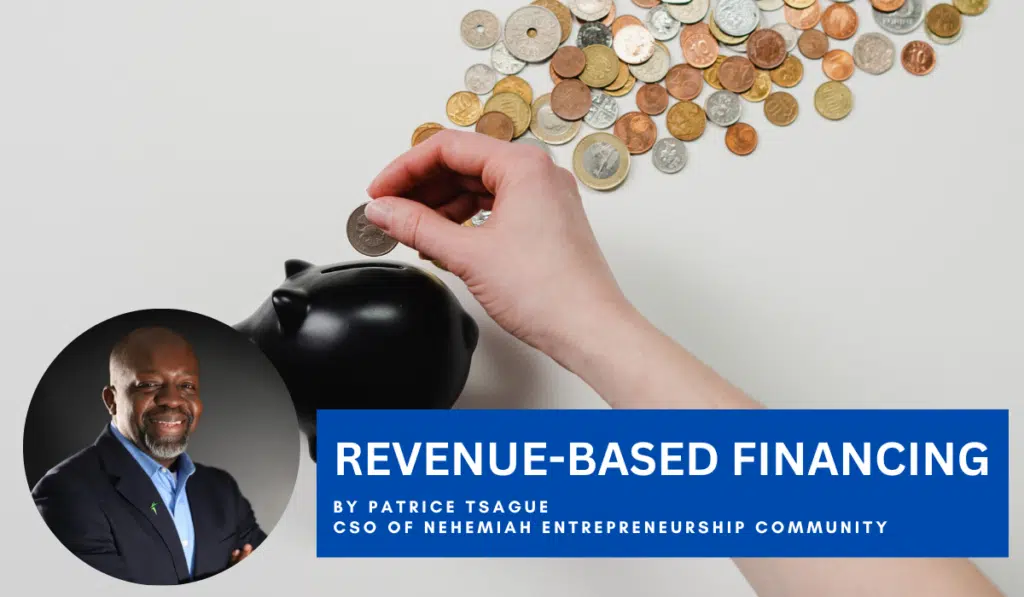We’ve all watched Shark Tank and seen the Sharks negotiate back and forth with an entrepreneur who has just made a pitch. What percentage of the company is the entrepreneur willing to give up to get the money?
What if you could raise money to grow your business without having to borrow money that you have to pay back or give up a percentage of your company? What if you can invest in companies and get paid for the revenue they generate instead of the profit or loss they make?
Imagine not having to worry about paying back debt or giving up a piece of your dream to a stranger or someone who may not always share your values.
Click the button below to learn more about an upcoming monthly educational webinar on Revenue-Based Financing. Learn how to start your journey in generating recurring income by investing in transformational companies or raising money for your business without the constraints of debt or diluting your ownership.
Debt Financing and Equity Financing
We all have heard about debt financing and equity financing, but very few people know or understand revenue-based financing. When an entrepreneur is looking to raise a startup or growth capital, he/she either turns to friends, family, or financial institutions to get the money in exchange for paying back with interest (debt financing) or provide them a share of the business in exchange for the money (equity financing). The Nehemiah Entrepreneurship Community has helped entrepreneurs raise over $2.5 Million dollars of financing through debt and equity financing.
These two approaches often create an undue burden on the business:
- Debt financing must be paid back with interest based on the loan term, with some type of collateral often required.
- Equity financing forces entrepreneurs to give up a percentage of their business without a clear understanding of the true value.
An Alternative Form of Business Financing
Revenue-Based Financing, also known as royalty-based financing, is a method of raising capital for a business from investors who receive a percentage of the enterprise’s ongoing gross revenues in exchange for the money it invested.
This form of financing is transparent and does not burden the company with debt or force the entrepreneur to prematurely give up equity in his/her company.
Advantages and Disadvantages of Revenue-Based Financing
The advantages include:
- Non-dilutive form of financing
- The interests of the investor and the company are aligned
- No collateral necessary or personal guarantees
- In most cases, it is cheaper than debt or equity financing
With all its advantages, there are some disadvantages:
- The business needs to have good gross margins to be able to set aside a percentage of revenue to pay investors
- The business must have active revenue streams since its payment to investors is based on revenue
- Does not work well with all companies
You may be wondering why you have not heard about this form of financing and why isn’t everyone using it.
Arthur Fox pioneered this funding model for early-stage businesses in New England, and it has been used in recent years to fund SAAS (Software as a Service) companies.
According to a financing course developed by the University of Vermont, while revenue-based or royalty financing seems like a relatively new financing model, it has historically been used in the oil, gas, and mineral industries. Speculators invested in oil, gas, or mineral extraction companies in exchange for a percentage of earnings from successful operations. More recently, this financing format has been used in the pharmaceutical and biotech industries.
| “Revenue-based financing (RBF) is the leading alternative to equity financing for startups”. – Lighter Capital |
ILOCX– Back companies when it counts
Though revenue-based financing is becoming more widely accepted, only one company has developed an effective trading platform to scale this type of investment strategy – ILOCX.
Click the button below to learn more about an upcoming monthly educational webinar on Revenue-Based Financing. Learn how to start your journey in generating recurring income by investing in transformational companies or raising money for your business without the constraints of debt or diluting your ownership.
ILOCX is the International Licensing Organisations Contract Exchange that is set up to streamline the discoverability of licensing opportunities and enable companies to reach new markets, increase brand awareness, and generate revenue.
The Nehemiah Entrepreneurship Community has partnered with ILOCX’s Founder, Edward Fitzpatrick, to accelerate the availability of capital for small to medium-sized enterprises as well as create a shared revenue culture that aligns the interest of investors with founders and innovators.
For more great articles that provide you with insights to help you with your entrepreneurship journey from discovery to succession, click HERE to view the Nehemiah Entrepreneurship Community’s library of Kingdom Business Resources.
Interested to know more about upcoming events and educational opportunities offered by the Nehemiah Entrepreneurship Community? Click HERE!
Sources:
https://www.uvm.edu/newfarmer/business/finance-guide/Chapter7.pdf
